I met Lia when I was a library trainee, which probably makes her the interviewee I’ve known longest (so it turns out 2011 was seven years ago, I hope that weirds everyone else out as much as me). Our library was lucky enough to host her for an author talk, and I slunk in the back with starry eyes and listening ears. Afterwards, I got to speak to her.
“But there’s heaps of people in there, how do you talk in front of them?”
“You steeple your fingers, so they can’t fidget.” *finger tent*
I still make finger tents when I do my workshops. I think there’s a clip of it on the ABC.
Lia has just released her third book to the world – my review of You Wish can be found here. I harrassed her on Twitter until she did the following interview. Enjoy!
How are you feeling about the upcoming release of your (third!!) novel?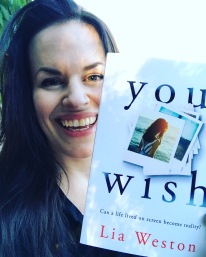
Excited, relieved and terrified in equal parts. Once a book goes out, you have no idea how it’s going to be received. It’s particularly nerve-wracking for You Wish because when it went to print, no-one had laid eyes on it except my publisher; I just had to trust them when they said they loved it. I’ve had some great early feedback, though. I also try to remind myself that you can only control what you can control, though, which is pretty good advice for most situations, writing or otherwise.
What was the biggest challenge you had to overcome while writing it?
 Time. I run a small retail business and work around sixty hours a week, so writing gets done around the edges. You Wish was largely fuelled by caffeine.
Time. I run a small retail business and work around sixty hours a week, so writing gets done around the edges. You Wish was largely fuelled by caffeine.
What was your favourite scene?
This is a tricky one! I love the bit with Kain in the creative department’s basement, as it’s fun to gang up on Kain, but my favourite is probably the Christmas in July scene because I always enjoy a party going horribly wrong.
Where did you get the idea for this novel?
As we’re generally a narcissistic society, I had assumed there was a company that would photoshop you into whatever situation you wanted, so instead of just daydreaming about living a particular life, you could have visual proof of it. I looked into it, out of curiosity, and found that no such company existed. Firstly, I wondered why not. Secondly, I wondered how far people would push the concept if the technology was available to them; instead of ‘Hey, can you put me in Pulp Fiction?’, it would become, ‘Hey, can you edit these wedding photos and change my wife to Jennifer Lawrence?’ Thirdly, I wondered what the effect would be if you were the person charged with editing people’s histories or creating lives for them that didn’t exist. Would it affect your sense of morality, or your sense of self? What would the ability to know what people really wanted do to you? It was too interesting not to explore.
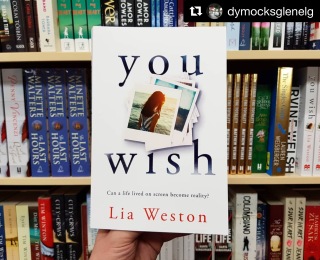
You mentioned title changes in a recent blog post. Is it difficult to let go of a title and rebrand the novel?
Originally I would have said, ‘not really’ as once the book’s out there, you have to let it go; it’s not like you can edit it (which is the reason why I never re-read my books once they’re in print). However, in my head I still refer to You Wish by its previous title, so maybe it’s too soon. I also renamed one of the main characters but it won’t stick in my brain; Mica is still ‘Kat’ to me.
Now a little about yourself:
When do you do the majority of your writing?
Whenever I can. I can sometimes squeeze it in after work, but I get the bulk of it done on Sundays. When deadlines are pressing, however, I will use any available minutes I have to write, so I tend to live like a hermit for months and then spend a lot of time afterwards apologising to my friends for my absence.
Can you run us through a typical writing day?
Sunday. Tip self out of bed, wash face. Try to eat something that’s not a pancake. Swear at the coffee machine. Wash face again, then hands. Locate comfy socks. Obsessively neaten desk. Open Pomodoro timer app *, then laptop. Open Scrivener**, re-read previous work, resist urge to set fire to laptop. Put on soothing soundtrack of vacuum cleaner or 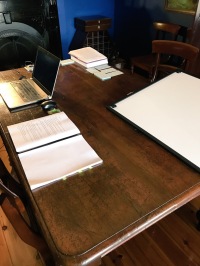 thunderous storm. Start timer. Work in Pomodoro blocks until too hungry to think straight. Avoid eating soup in front of laptop due to previous experiences. Post-soup, continue working in Pomodoro blocks. Forget to do physio-appointed stretches, find body has frozen into rictus position. Fall out of chair, crawl around until the feeling returns. Revive spirits with chocolatey snack. Resume timer. Work until Pomodoro target is met. Go outside, reel from outdoorsy brightness. Attempt yoga, fall asleep on mat, wake in time to order takeaway. Wash face, shower, wash face again. Sleep the sleep of the damned.
thunderous storm. Start timer. Work in Pomodoro blocks until too hungry to think straight. Avoid eating soup in front of laptop due to previous experiences. Post-soup, continue working in Pomodoro blocks. Forget to do physio-appointed stretches, find body has frozen into rictus position. Fall out of chair, crawl around until the feeling returns. Revive spirits with chocolatey snack. Resume timer. Work until Pomodoro target is met. Go outside, reel from outdoorsy brightness. Attempt yoga, fall asleep on mat, wake in time to order takeaway. Wash face, shower, wash face again. Sleep the sleep of the damned.
* Pomodoro: a technique of working in focused 25-minute blocks with 5-minute breaks between. It’s pretty effective; you can do most things for 25 minutes even if you’re a chronic procrastinator like me.
** Writing software. Highly recommended, and not expensive.
What was your first ever novel?
The Fortunes of Ruby White. I completed it partly just to find out how it ended but mostly because I didn’t want to be one of those people who had a half-written novel somewhere in a desk drawer. I loathe unfinished business. I don’t know what that says about me, coupled with the constant face-washing.
What’s something you know now that you wish you knew when you started out?
That anyone who asks you to write content in exchange for ‘exposure’ is not worth your time. Value your output. There’s a perception that creative work should somehow always be free, so fight that wherever you can. (Oh, and when you’ve got a book coming out, be prepared for people to ask you, “How many pages is it?” Just make it up. No-one ever checks.)
Any other hobbies that threaten writing time?
Sleep, cooking, kickboxing and socialising. (Wait, is ‘procrastination’ a hobby? And does looking up John Wick training videos count as ‘procrastination’? No, it’s research. Research.)
My favourite section (time to vent!):
What genre do you have no interest in writing?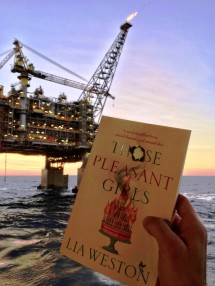
Crime. I can understand the lure of psychological thrillers or police procedurals, but I find gruesome torture-style crime writing very weird, so you can be pretty sure I’m not going to be producing Wolf Creek: The Wolfening at any point soon.
What is the weirdest thing you’ve had to research?
For Those Pleasant Girls, how much an adult male swan weighs. (Around fifteen kilos, for the record.) For You Wish, whether it’s possible to jump from a dumpster onto a fire escape ladder. (It is.)
What is the strangest question or remark you’ve received about your books/writing?
Years ago, one blogger reviewed of The Fortunes of Ruby White and said she couldn’t get past all the “forced prostitution”. I still have absolutely no idea what she was referring to. I figure I’d remember writing that into it.
Describe the worst book you’ve ever read without naming it:
Hello, I’m a self-obsessed woman who decides to leave my family because I’ve met a guy half my age who has a butt you could bounce a coin off. According to our numerous sex scenes, I have three arms. Oh, hooray, now I’m the Australian Outback but everyone speaks as if they’re from Iowa. Wait, where’s my boyfriend going? Ah, well, time to die in the desert.
Your biggest pet peeve about the publishing industry:
The fact that publishers want something completely original but not so original that they can’t compare it to an existing work. ‘If you love [X author], you’ll also love [Y author].’ I completely understand it—it’s a business after all, and marketing is a huge part of that—but if you’re a writer who’s harder to categorise, it can mean you’re shunted into a genre you may not necessarily belong to.
The cliché you can’t stand in other books:
I don’t know if it’s a cliché, exactly, but I get cranky with conflict scenes where body language is badly described. I read a novel recently where the main character ‘clenched’ their jaw, ‘chattered’ their teeth, ‘shuddered’, ‘sobbed’, and ‘ground out’ their sentences, all at the same time. That’s not anger; that’s some kind of seizure. More movement does not equal more emotion, people. Keep it lean.
The longest you’ve ever gone without writing, and why?
After university, I stopped writing for several years. I was involved with someone who considered himself A Sensitive Artist and apparently there’s only room for one writer in any relationship. (Did you know there was a quota? I sure didn’t.) Although he rarely actually produced anything himself, he criticised whatever I produced, so I stopped. I know, I know. He was a skilled gaslighter.
What do people say about writing that ticks you off the most upon hearing it?
“Oh, I’ve always wanted to write a novel,” with the air that it’s something they could casually toss together over the long weekend and the only reason they haven’t bothered is that their life is already too full of fabulous creativity. Also, I can guarantee that the people who say, “My friends say I should write a book!” are the most teeth-grindingly boring, painful people to be sat next to at a dinner party. Try to poison their dessert. You’ll do us all a favour.
Moving on:
Who is your personal cheerleading squad?
My girlfriend Jenny has loved anything I’ve written since I started scribbling terrible poems to make her laugh in Year Eight. It takes a lot of the pressure off when you have an uncritical reader. My husband Pete is not an uncritical reader, but he has an apparently unshakeable belief that my work is worthwhile, which both surprises and encourages me. Another girlfriend, Carla, sends me enthusiastic ‘you can do it!’ emoji-riddled messages when she knows I’m battling with an edit; her timing is uncanny. So the three of them are a pretty solid foundation when I’m in setting-fire-to-laptop mode.
Describe your writing space in three words:
Organised. Organised. Organised.
Do you have any writing buddies?
I didn’t know any other writers when I was writing The Fortunes of Ruby White. I tried a writing group afterwards, but it just didn’t work for me, unfortunately, as nice as they were. Fortunately, I’ve got to know a few local authors since then—Patrick Allington, Allayne Webster and Vikki Wakefield in particular—plus several more through social media who are a huge source of support. We don’t swap our work, but we do exchange war stories. The actual writing part I prefer to do on my own, in my Fortress of Pomodoro and Vacuum Cleaner Noises.
What does the future hold for you?
I’ve been working basically nonstop on the last two books for almost three years, so I’m going to have a sleep, try to catch up on all the films I missed, and then try to find a new story idea which doesn’t involve me researching an impossible area. (So far, all my potential plots involve information that I’ll either have to travel across the world or invent a time machine for.) Wish me luck!
Find Lia and her books!
Paperback
eBook
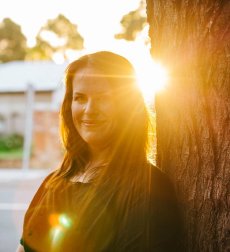
Omg, I love this post! It’s so awesome that you have an author from your home town that you know personally. And this interview was really fun to read — great work! 🙂